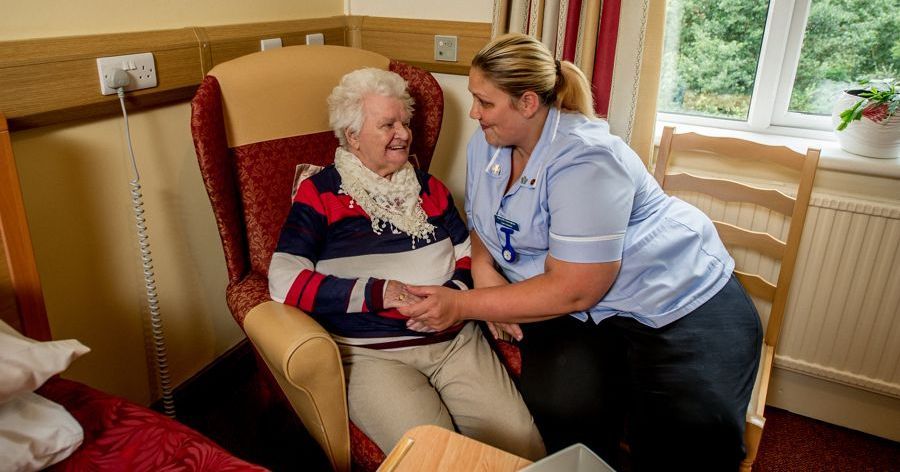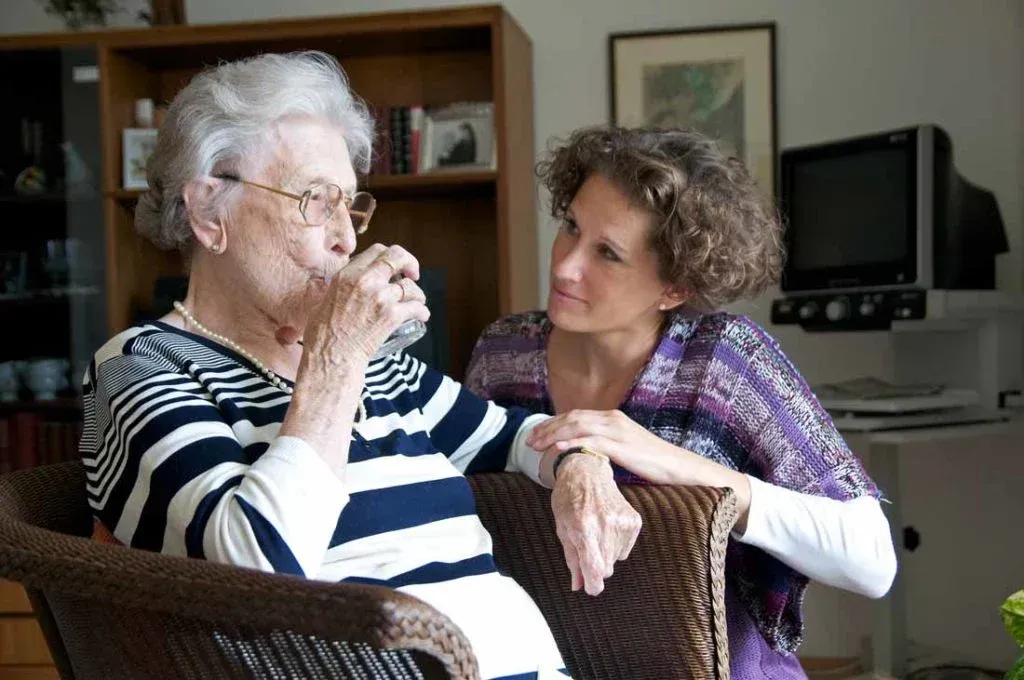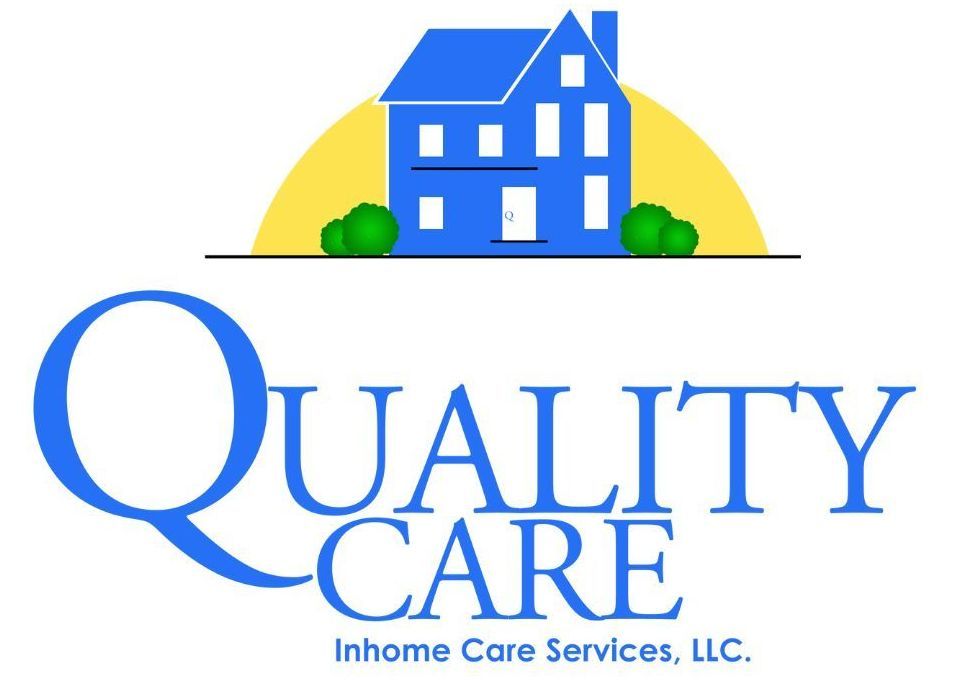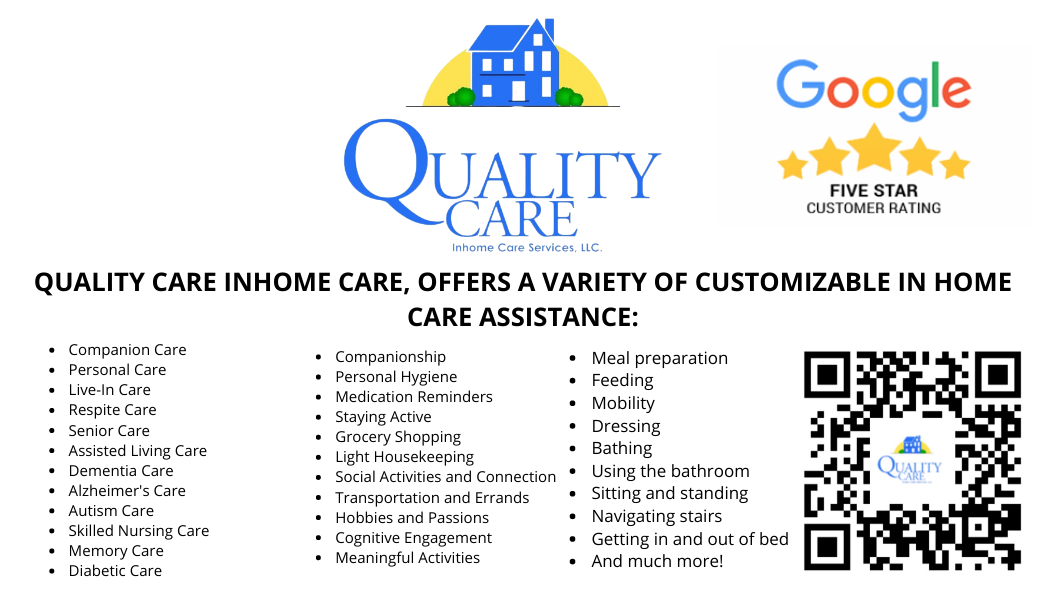Tailored Support: How Quality In-Home Care Benefits Atlanta's Special Needs Population
How Quality In Home Care Benefits Atlanta Residents

Providing quality care for individuals with special needs is of paramount importance in fostering their overall well-being and enhancing their quality of life. In Atlanta, there is a growing recognition of the significance of tailored support through high-quality in-home care services. This blog will delve into the ways in which quality in-home care benefits the special needs population in Atlanta, highlighting the positive impact it has on their independence, social integration, and overall happiness.
Individualized Care Plans:
One of the key advantages of quality in-home care for Atlanta's special needs population is the creation of individualized care plans. Each person has unique needs, abilities, and preferences, and a comprehensive assessment allows care providers to tailor their approach accordingly. By customizing care plans, individuals with special needs receive targeted support that addresses their specific challenges, promoting their overall development and well-being.
Promoting Independence:
Quality in-home care empowers individuals with special needs to lead more independent lives. Caregivers are trained to provide support while encouraging autonomy and self-sufficiency. Through personalized care plans, individuals receive assistance with daily activities, such as personal hygiene, meal preparation, and medication management, enabling them to maintain a sense of dignity and control over their lives.
Enhanced Emotional Well-being:
Living with special needs can often lead to feelings of isolation, anxiety, and depression. Quality in-home care plays a vital role in addressing these emotional challenges by providing compassionate companionship and emotional support. Caregivers develop trusting relationships with their clients, fostering a sense of belonging and reducing feelings of loneliness. Regular interaction and engagement contribute to improved emotional well-being and a more positive outlook on life.
Improved Social Integration:
Social integration is essential for individuals with special needs to thrive and lead fulfilling lives. Quality in-home care promotes social interaction by organizing and facilitating community outings, recreational activities, and participation in local events. Caregivers act as advocates, helping individuals with special needs to connect with community resources, support groups, and other individuals facing similar challenges. This social integration boosts their confidence, expands their social networks, and enhances their overall quality of life.
Specialized Healthcare:
Quality in-home care for Atlanta's special needs population goes beyond assistance with daily living activities. Care providers with specialized training are well-equipped to manage complex medical conditions and disabilities. From administering medications to providing skilled nursing care, the caregivers ensure that individuals with special needs receive the medical attention they require within the comfort and familiarity of their own homes.

Family Involvement and Respite:
In addition to benefiting the individuals themselves, quality in-home care also provides relief and support to their families. Caregivers work closely with family members, involving them in the care planning process and keeping them informed about their loved one's progress. This collaboration eases the burden on family caregivers and allows them to have peace of mind, knowing their loved one is receiving professional care. Additionally, in-home care services can offer respite for family caregivers, allowing them time to recharge and attend to their own needs.
Continuity of Care:
Consistency and continuity of care are crucial for individuals with special needs. Quality in-home care providers ensure that individuals receive consistent support from the same caregivers, building trust and familiarity. This continuity promotes a sense of stability and reduces the stress associated with transitioning between different care settings.
Quality in-home care plays a pivotal role in benefiting Atlanta's special needs population. By providing tailored support, promoting independence, enhancing emotional well-being, facilitating social integration, delivering specialized healthcare, involving families, and ensuring continuity of care, in-home care services empower individuals with special needs to live fulfilling lives. The compassionate and professional assistance they receive enables them to overcome challenges, maximize their potential, and lead lives filled with dignity and purpose.
As Atlanta continues to recognize the importance of quality in-home care for individuals with special needs, it is crucial to advocate for increased accessibility and support. This includes raising awareness among healthcare providers, policymakers, and the wider community about the benefits and significance of tailored support. By working together, we can create a more inclusive society that celebrates the abilities and potential of every individual, regardless of their unique challenges.
Furthermore, it is essential to emphasize the training and qualifications of caregivers providing in-home care for individuals with special needs. Quality in-home care providers invest in ongoing training and education to ensure that their staff members possess the knowledge, skills, and empathy necessary to deliver exceptional care. By prioritizing professionalism and expertise, these caregivers become invaluable allies in the journey toward better quality of life for individuals with special needs.
In conclusion, quality in-home care is a lifeline for Atlanta's special needs population. It offers tailored support that addresses their unique challenges and needs, promotes independence and social integration, enhances emotional well-being, provides specialized healthcare, involves families, and ensures continuity of care. By embracing and supporting quality in-home care, we can create a nurturing and inclusive environment that allows individuals with special needs to thrive, achieve their goals, and lead fulfilling lives.
Let us stand together and advocate for increased accessibility, awareness, and resources for quality in-home care services in Atlanta. By doing so, we can build a society that values and embraces the diversity and potential of every individual, ensuring that no one is left behind.

Welcome to a realm of unparalleled healthcare excellence! Quality Care Inhome Care Services is proud to announce that our Atlanta-based home healthcare agency has clinched the prestigious Consumer Choice Award, a testament to our unwavering commitment to providing top-notch healthcare services. In this article, we delve into the intricacies of our agency, highlighting the factors that set us apart and led to this prestigious recognition.

Introduction In the bustling city of Atlanta, where the pulse of progress beats strong, there exists an extraordinary entrepreneur whose heart-driven mission has touched the lives of countless individuals. Meet Mr. Quality Care, a visionary with a passion for creating positive change in his community. As the founder and driving force behind Quality Care Inhome Care Services, Mr. Quality Care's journey is a testament to the power of heartfelt entrepreneurship.

When seeking care options for yourself or a loved one in Atlanta, understanding the differences between home healthcare and non-medical homecare services is essential. While both options aim to support individuals in the comfort of their own homes, they vary in terms of the level of medical assistance provided. In this comprehensive guide, we will delve into the distinctions between home healthcare and non-medical homecare services in Atlanta. By the end of this article, you'll have a clear understanding of each option and be better equipped to make informed decisions about your care needs.

Finding high-quality in-home care in Atlanta is crucial for our loved ones' health and wellbeing. When looking for help for elderly parents, people with disabilities, or those who are recovering from an illness or surgery, it's important to pick a home care provider who provides excellent care and comprehends the specific requirements of each person. We will examine the crucial elements to take into account while locating reputable home care in Atlanta in this complete guide. By the end, you'll have the knowledge you need to make wise choices and find the top local home care providers.

Alzheimer's disease and other forms of dementia present unique challenges for individuals and their families. As these conditions progress, individuals often require specialized care and support to ensure their safety, comfort, and overall wellbeing. In-homecare emerges as a crucial solution, offering tailored assistance within the familiar surroundings of their own homes. This article explores the importance of in-homecare for Alzheimer's and dementia patients, highlighting the benefits it provides and the key role it plays in enhancing their quality of life.

In today's fast-paced world, more and more individuals are seeking care options that allow them to receive assistance and support in the comfort of their own homes. Home-based care services have gained popularity, offering individuals the opportunity to age in place, recover from illnesses, or manage chronic conditions. Two common terms used in this context are "homecare" and "home healthcare." While they may seem similar, they have distinct differences in terms of the services provided, the level of medical care involved, and the qualifications of the caregivers. This article aims to provide a comprehensive understanding of these differences, helping individuals make informed decisions about the type of care that best suits their needs.

Promoting the wellbeing of the special needs community in Atlanta is of utmost importance in ensuring their overall quality of life and happiness. Quality in-home care plays a pivotal role in supporting individuals with special needs, empowering them to thrive and reach their full potential. This blog will explore the value of quality in-home care for Atlanta's special needs community, highlighting its impact on their physical health, emotional well-being, social integration, and overall quality of life.

When it comes to providing care for aging loved ones, families often face the decision between non-medical in-home care and assisted living. Both options have their merits, but it's crucial to understand the differences and make an informed choice. In this blog post, we will explore the key aspects of non-medical in-home care and assisted living in Atlanta, helping you make the best decision for your family's unique needs.

Private home care has become an increasingly popular option for seniors and individuals with disabilities who wish to receive care in the comfort of their own homes. Georgia, a state known for its rich history and southern charm, has a growing demand for private home care services. But what exactly is a private home care provider in Georgia? In this comprehensive guide, we will delve into the world of private home care providers, explaining their services, benefits, regulations, and qualifications. Whether you are a family member seeking care for a loved one or an individual in need of assistance, this blog post will provide you with valuable insights into private home care providers in Georgia. Understanding Private Home Care Private home care, also known as in-home care, is a type of healthcare service that is provided in the comfort of an individual's own home. Private home care providers offer a wide range of services tailored to meet the unique needs of each individual. These services can include personal care, companionship, medication management, meal preparation, light housekeeping, and assistance with activities of daily living (ADLs) such as bathing, dressing, and grooming. In Georgia, private home care providers are typically non-medical providers, meaning they do not provide medical services such as administering medication or performing medical procedures. However, they work closely with healthcare professionals to ensure the overall well-being of the individual receiving care. Services Provided by Private Home Care Providers in Georgia Private home care providers in Georgia offer a wide range of services to meet the varying needs of their clients. These services may include: Personal Care: Private home care providers assist with personal hygiene, such as bathing, grooming, and dressing. They also provide assistance with mobility, transfers, and positioning to prevent falls. Companionship: Private home care providers offer companionship and emotional support to individuals who may feel lonely or isolated. They engage in social activities, conversation, and hobbies to enhance the overall well-being of the client. Medication Management: While private home care providers in Georgia cannot administer medication, they can help with medication reminders, organizing pillboxes, and ensuring that medications are taken as prescribed. Meal Preparation: Private home care providers can prepare nutritious meals and snacks based on the dietary preferences and restrictions of the individual. They also assist with feeding, if necessary. Light Housekeeping: Private home care providers help with light housekeeping tasks such as laundry, dishwashing, and maintaining a clean and safe environment for the client. Assistance with ADLs: Private home care providers assist with activities of daily living (ADLs) such as toileting, transferring, and ambulation. They also provide continence care and manage incontinence products. Transportation: Private home care providers may provide transportation services to help individuals get to appointments, social events, and other outings. Benefits of Private Home Care in Georgia Private home care offers numerous benefits to individuals in Georgia who wish to receive care in their own homes. Some of the key benefits of private home care include: Personalized Care: Private home care providers develop personalized care plans tailored to meet the unique needs and preferences of each individual. This allows for individualized attention and care, promoting overall well-being. Comfort of Home: Private home care allows individuals to receive care in the familiar and comfortable surroundings of their own homes. This can help reduce stress and anxiety associated with moving to a care facility. Independence and Dignity: Private home care encourages individuals to maintain their independence and dignity. It allows them to continue their daily routines, hobbies, and social activities, promoting a sense of normalcy and autonomy. One-on-One Attention: Private home care providers in Georgia typically offer one-on-one care, allowing for personalized attention and building meaningful relationships between the caregiver and the client. This promotes trust, comfort, and companionship. Cost-Effective: Private home care can be a more cost-effective option compared to other types of care, such as nursing homes or assisted living facilities. It allows individuals to receive the necessary care in their own homes without incurring the higher costs associated with care facilities. Family Involvement: Private home care also allows for family members to be involved in the care process. Family members can actively participate in the care plan, provide input, and be involved in decision-making, ensuring the best care possible for their loved ones. Regulations and Qualifications for Private Home Care Providers in Georgia Private home care providers in Georgia are regulated by the Georgia Department of Community Health (DCH) and are required to meet certain qualifications. Some of the regulations and qualifications for private home care providers in Georgia include: Licensing: Private home care providers in Georgia are required to obtain a license from the Georgia Department of Community Health (DCH) to operate legally. The DCH conducts inspections and ensures that providers meet the necessary requirements to ensure quality and safe care. Background Checks: Private home care providers in Georgia are required to undergo thorough background checks, including criminal history and abuse registry checks, to ensure the safety and well-being of clients. Training and Certification: Private home care providers in Georgia are required to undergo training and obtain certification in basic caregiving skills, first aid, and CPR. Some providers may also offer specialized training for specific conditions, such as dementia care. Care Plans: Private home care providers in Georgia are required to develop and implement care plans that are tailored to meet the unique needs of each individual. Care plans should be regularly reviewed and updated to ensure that the care provided is appropriate and effective. Supervision and Oversight: Private home care providers in Georgia are required to have a system in place for supervision and oversight of caregivers to ensure that they are providing safe and quality care to clients. Insurance and Bonding: Private home care providers in Georgia are required to carry liability insurance and bonding to protect clients and their families from any potential damages or losses. Conclusion Private home care providers in Georgia offer valuable services to individuals who wish to receive care in the comfort of their own homes. They provide personalized care, promote independence, and offer various services tailored to meet the unique needs of each individual. However, it's important to ensure that private home care providers meet the necessary regulations and qualifications to ensure quality and safe care. If you or your loved one is considering private home care in Georgia, be sure to thoroughly research and choose a reputable provider to ensure the best care possible.









